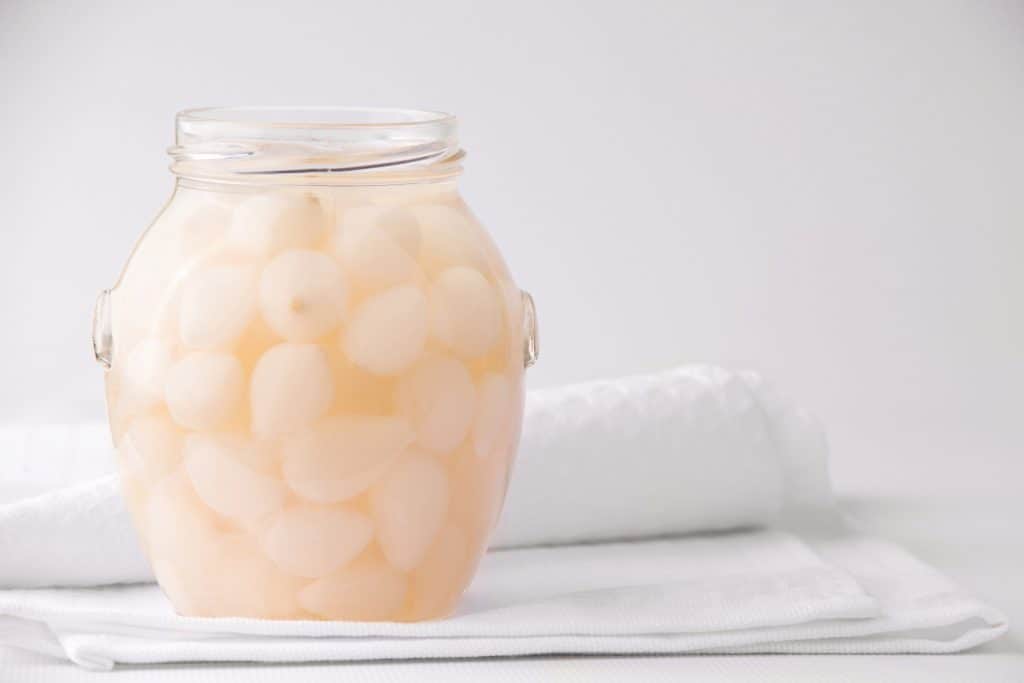
Onions are the most dependable kitchen partners we can get. For if there’s an onion in the house you know you can easily make something out of it. With very little coaxing, onions can provide us with a wide range of flavours – from sharp and spicy, to raw and mellow and sweet when cooked. How empty our kitchen would be without onions!
However, not everyone loves the taste of raw onions and especially in foods like sandwiches, salads, or wraps. This is where fermentation can help. Fermented onions take away the rawness and replace it with a sweet and tangy flavour that most people are bound to love.
I can vouch for this fact that the lingering after-taste of the fermented onions recipe given below is nowhere near as strong as fresh, raw onions. An after-taste will still remain but even someone with a strong dislike for raw onions can easily eat a spoonful or two of these fermented onions without making a face.
So let us dive into the steps of how to make fermented onions. But before we do so, here are some health benefits of fermented onions.
Benefits of fermenting onions
One of the most important health benefits of fermented onions is their probiotic content. New research shows the importance of gut microbiome or the colony of our intestinal bacterial. There is good evidence that fermented vegetables like fermented onions can play a role in the creation and maintenance of a diverse and healthy population of gut bacteria.
This diversity is good for our health and well-being. Evidence also shows that cultures which rely heavily on processed foods and eat fewer probiotic foods tend to suffer more from allergies, obesity, and even depression. All these health issues are now being linked to the health and diversity of the gut microflora.
Apart from probiotics, fermented vegetables also have enhanced vitamin content. The fermentation process tends to increase the vitamins so if you are eating raw onions, you are actually eating a vegetable lower in vitamins than fermented onions.This may be due to the fact that fermentation enhances the absorbability of the vitamins and minerals present in the vegetables.
Preservation is another benefit of fermenting onions. Leave onions in your pantry for a couple of weeks and chances are that they will get mushy and mouldy soon.
But if you ferment onions, they become zesty and delicious and even turn into flavourful and healthful foods that will keep for months, even years. It is no wonder that people used fermentation to preserve their produce long before airtight containers and refrigeration were invented.
Fermenting onions also takes away the acrid and pungent odour of raw onions and replaces it with a twang that is mild and non-obnoxious. At the same time fermentation, if done right, retains the crispiness of the onions so you can enhance the taste of your favourite savoury dishes even more.
Fermenting onions is also easy and fun and when you do the process right, there is no reason why your onions won’t be crispy, taste tangy, and also last for months to come.
Here are the steps for making fermented onions.
Print
Fermented Onions Recipe
- Total Time: 15 minutes
- Yield: 2 quarts 1x
Description
Simple and easy fermented onions recipe.
Ingredients
- 4 large red onions, sliced thin or made into rings
- 6 cups water
- 2 tbsp kosher salt
Instructions
- Pack the onion rings or slices into 1-half gallon or 2-quart size jars.
- In a separate bowl, combine the water and salt together and stir until dissolved.
- Now pour the brine into the jars until the onions are completely submerged. Prepare more brine if needed.
- Close the lids and leave the jars in a cool, dry place away from direct sunlight.
- There will be CO2 build-up in the first week. Release the bubbles by slightly loosening the lid and closing it right away. Do not open the lid completely.
- When fermentation stops, test the brine with pH strips. Do not consume the onions if there is a strong, rotten egg-like aroma or if the brine pH is over 4.0
- If there is surface mould (known as Kahm yeast) there is nothing to be concerned about. Simply skim the top mouldy layer and test the pH. Harmful bacteria cannot survive in brine with pH below 4.0.
- When fermentation is to your liking, move the jars to a refrigerator.
Notes
These onions can last anywhere between 6 months to 1 year. Note that after a few months, they are still edible despite their dull, faded appearance.
- Prep Time: 15 minutes
Conclusion
Fermented onions last long, taste great, and most importantly, they do not have that pungent odour of their raw counterparts. I hope you give this fermented onion recipe a try. I am sure you will be making it year after year.
Recommended
How to Make Fermented Honey [Garlic Honey Recipe]

Can you cook with fermented onions in places of regular onions in a recipe? Or does it taste weird? I find I can tolerate many fodmap foods if they are fermented, so I want to try fermented onions. I love onions and miss them!
I’ll at least enjoy these on some tacos!